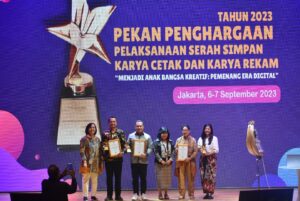Implementation of Legal Deposit at the National Library of Republic of Indonesia
15 September 2025
The National Library of the Republic of Indonesia (NLI) has a strategic role in maintaining the nation’s collective memory by storing, preserving, and providing access to works that reflect the cultural, scientific, and social journey of society. One of the main mechanisms to fulfil this role is through the legal deposit of works, namely the submission of copies of printed and recorded works to the National Library. This seemingly simple activity has a significant impact on the preservation of Indonesia’s intellectual and cultural heritage.
The Directorate of Legal Deposit and Library Collection Development is the unit entrusted with carrying out this activity. In accordance with Law Number 13 of 2018 concerning the Legal Deposit of Printed and Recorded Works, both publishers and producers of recorded works are required to submit their collections to the library, with the provision that two copies of each printed work title and one copy of each recorded work title must be deposited. As of 2025, the total number of works collected by NLI has reached 2,215,457 copies of printed work and 1,417,647 copies of recorded work.
The legal deposit of printed and recorded works ensures long-term preservation. Printed works (books, magazines, pamphlets) and recorded works (audio recordings, videos, films, microfilms) are vulnerable to physical damage, loss, and format obsolescence. By storing copies at the National Library, which is equipped with conservation facilities, these works receive proper treatment according to established standards. In addition to preserving the physical format, legal deposit also safeguards the content format of digital recorded works (e-book, e-journal, e-publication) through the e-Deposit application, which enables publishers or producers of recorded works to upload and store their works via the platform.
The legal deposit mechanism holds legal and administrative value. Copies stored at the national institution can serve as proof of the existence of a work at a specific point in time, which is useful for copyright, publishing rights, and other disputes. In addition, having a centralised collection enables the government and other institutions to monitor the development of information and cultural production in the country.
Legal deposit also plays a role in promoting the continuity of intellectual and cultural production. Creators, publishers, and producers who know that their works will be securely archived tend to be more motivated to create. This, in turn, supports the sustainability of the creative industry, strengthens cultural identity, and ensures that important works are not lost once their commercial circulation comes to an end.
The implementation of the legal deposit of printed and recorded works faces significant challenges, one of which is the large number of publishers in Indonesia, many of whom are still unaware of the meaning and obligations stipulated in Law No. 13 of 2018. To address this issue, the Directorate of Legal Deposit and Library Collection Development conducts annual outreach activities on the implementation of Law No. 13 of 2018 concerning the Legal Deposit of Printed and Recorded Works in various provinces across Indonesia. The participants include relevant stakeholders such as regional libraries, publishers, and producers of recorded works.
To encourage the enthusiasm of publishers and producers of recorded works, NLI also grants awards to those who have consistently and properly carried out the legal deposit of their works. The awards are presented annually. It is expected that this recognition will also motivate publishers whose level of submission is still low to participate in the legal deposit program.

For the legal deposit to be effective, awareness and cooperation from various parties are essential, including authors, publishers, producers of recorded works, educational institutions, and the general public. Practical steps that can be taken include understanding the applicable legal deposit regulations, preparing high-quality copies to be submitted, and establishing communication with the National Library or the relevant regional libraries.
In conclusion, preserving works through legal deposit is not merely an administrative obligation. It is a collective responsibility to protect the nation’s cultural memory. By submitting printed and recorded works to the NLI, creators and stakeholders contribute directly to the efforts of preservation, access to knowledge, and the sustainable development of national identity. Let us make legal deposit a natural part of the creative process for a well-informed present and a future that inherits the richness of Indonesia’s works.
Contributed by Welliyani Citra, Librarian, Directorate of Legal Deposit and Library Collection Development, National Library of Republic of Indonesia